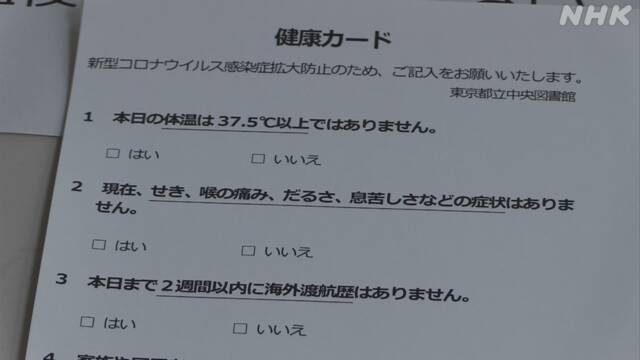What should I do to fill in the name of the reopening library user? May 31 17:29
While libraries in various regions are starting to reopen after the declaration of an emergency has been lifted, we are having a hard time responding to whether users are asked to enter their names and contact information as part of infection control measures. When reopening the library, it is assumed that the records of people entering the library will help identify the contact person in the event of an infected person within the library, while assuming that the library does not violate the privacy of the user. Since, the correspondence is divided in each library.
Of these, the Tokyo Metropolitan Central Library, which will be reopening from 1st with advance reservations, has decided to require users to enter their name and contact information as well as their health status when entering.
Kazuya Tanada, Service Manager, said, "I think it is unavoidable to receive the user's information, considering the safety of the people who are using the second and third waves of corona." I am.
On the other hand, at the “Mirai on Library” of Nagasaki Prefectural Government, which was reopened on 19th of this month, the number of infected people is not increasing in the prefecture and it is difficult to request after explaining the purpose and reason to all users. You are not asked to fill in.
Director Masashi Watanabe said, “If you try to stop at the entrance and explain each person's situation and collect personal information, there will definitely be confusion. While various infection prevention measures are being taken, it is currently used. We have decided that we will not collect personal information about other people. "
“SaveMLAK,” a voluntary organization that collects information on cultural facilities across the country, has searched the websites of libraries across the country and has revealed that it is recording the admission of users as of the 21st of this month. There are 93 buildings, only a small number.
Reviewing the expressions of the Japan Library Association Guidelines
Regarding whether or not visitors are asked to fill in their names and contact information, the “Japan Library Association”, which is made up of libraries all over the country, is busy taking measures such as reviewing the guidelines.
As one of the concrete measures, the Association's "Guidelines for Preventing the Spread of Infection" announced on 14th of this month considers the local circumstances and the risk of infection, and then "Understand your name and emergency contact information. "Create a list of people."
Since then, as opinions and questions have been gathered from libraries in various regions, the association issued a "supplementary explanation" on the 20th, saying that "it is not mechanically obligatory to carry out all the items", and "sufficient As a result of the examination, it is quite possible that the visitor list will not be created. "
Furthermore, on the 26th, the content of the guideline will be updated and "will be carried out after each library voluntarily judges whether it is necessary or not." Will be carried out and implemented. "
Expert “Each library independently thinks and makes decisions”
When reopening cultural facilities, the government's expert council made a recommendation on behavioral change on 4th of this month, saying, "In case of an infection, depending on the type of industry, the list of attendees should be properly prepared. It is possible to manage it. "
On the other hand, the Japan Library Association's "Declaration on liberty of the library" stipulates that "the library does not violate the privacy of users regarding the fact that the library is used other than reading records." The user's confidential information such as name and contact information is protected.
Regarding this, Prof. Manabu Shimada of Nara University, who is familiar with the situation in the library, said, "I think that each library has its own public interest in both preventive measures against infectious diseases and protection of privacy. If you do not do that, you should carefully consider whether it is helpless, and if you do it, it is the responsibility of the library to carefully explain the purpose and handling. "

